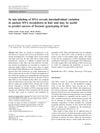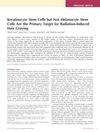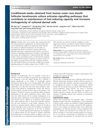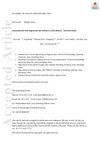128 citations,
August 2020 in “Cell stem cell” Dermal fibroblasts have adjustable roles in wound healing, with specific cells promoting regeneration or scar formation.
124 citations,
January 2012 in “Journal of Allergy and Clinical Immunology” Endocannabinoids help control mast cell activity in human skin.
23 citations,
October 1996 in “Dermatologic clinics” Genes affect cytokine production, which can influence chronic diseases, and certain interventions may help prevent related molecular damage.
22 citations,
June 2017 in “Stem cell reports” PTEN helps control the number and health of skin stem cells by working with the protein BMAL1.
11 citations,
July 2015 in “Journal of Anatomy” SLVs help maintain muscle stretch sensitivity and could aid in treating hypertension and muscle spasticity.
 11 citations,
May 2010 in “Journal of Medicinal Chemistry”
11 citations,
May 2010 in “Journal of Medicinal Chemistry” A new compound was created in 2010 that can control oil production when applied to the skin, and its effects are completely reversible after two weeks.
 6 citations,
November 2022 in “Development”
6 citations,
November 2022 in “Development” New research shows that skin diversity is influenced by different types of dermal fibroblasts and their development, especially involving the Wnt/β-catenin pathway.
 October 2023 in “Cell & bioscience”
October 2023 in “Cell & bioscience” A special gene region controls the re-emergence of a primitive wool type in Merino sheep, improving their wool yield and adaptability.
111 citations,
August 1998 in “Journal of Investigative Dermatology” μ-opiate receptors in skin cells may affect skin health and healing.
 14 citations,
July 2011 in “Experimental Dermatology”
14 citations,
July 2011 in “Experimental Dermatology” Applying EGCG on the skin can prevent hair loss caused by testosterone in mice.
 27 citations,
April 2011 in “International journal of legal medicine”
27 citations,
April 2011 in “International journal of legal medicine” In situ DNA labeling in hair can help predict forensic DNA analysis success.
 1 citations,
January 2017 in “Clinical approaches and procedures in cosmetic dermatology”
1 citations,
January 2017 in “Clinical approaches and procedures in cosmetic dermatology” Hair can't be reliably repaired once damaged; prevention and proper product use are key to maintaining hair health.
 April 2021 in “Journal of Investigative Dermatology”
April 2021 in “Journal of Investigative Dermatology” A trial showed that a new treatment is safe and effective for male pattern baldness, with most participants growing new hair.
 January 2017 in “Clinical approaches and procedures in cosmetic dermatology”
January 2017 in “Clinical approaches and procedures in cosmetic dermatology” Cosmetic procedures can harm hair, but damage can be minimized with knowledge and care; however, once hair is damaged, it cannot be reliably repaired.
 192 citations,
March 1998 in “British Journal of Dermatology”
192 citations,
March 1998 in “British Journal of Dermatology” Minoxidil boosts growth factor in hair cells, potentially promoting hair growth.
 166 citations,
November 1990 in “Journal of Investigative Dermatology”
166 citations,
November 1990 in “Journal of Investigative Dermatology” Minoxidil sulfate stimulates hair growth.
 113 citations,
September 2005 in “Journal of Investigative Dermatology”
113 citations,
September 2005 in “Journal of Investigative Dermatology” Applying a special compound can promote hair growth without harmful side effects.
 87 citations,
March 2005 in “Journal of Dermatological Science”
87 citations,
March 2005 in “Journal of Dermatological Science” Asiasari radix extract promotes hair growth and increases protein synthesis and cell proliferation.
 81 citations,
February 1997 in “Journal of Investigative Dermatology”
81 citations,
February 1997 in “Journal of Investigative Dermatology” Minoxidil boosts hair growth by activating PGHS-1.
 45 citations,
September 2012 in “Life Sciences”
45 citations,
September 2012 in “Life Sciences” Aconiti Ciliare Tuber extract may help hair grow by activating a specific cell signaling pathway.
 41 citations,
January 2007 in “Journal of Korean Medical Science”
41 citations,
January 2007 in “Journal of Korean Medical Science” Minoxidil and ATRA together boost hair growth more effectively than minoxidil alone.
 39 citations,
October 2013 in “Plastic and Reconstructive Surgery”
39 citations,
October 2013 in “Plastic and Reconstructive Surgery” Human alpha defensin 5 helps heal wounds, reduce bacteria, and grow hair on burned skin.
 30 citations,
April 2013 in “Journal of Investigative Dermatology”
30 citations,
April 2013 in “Journal of Investigative Dermatology” Radiation mainly affects keratinocyte stem cells, not melanocyte stem cells, causing hair to gray.
 17 citations,
May 2011 in “Gene Therapy”
17 citations,
May 2011 in “Gene Therapy” Using polyethylenimine-DNA to deliver the hTERT gene can stimulate hair growth and may be useful in treating hair loss, but there could be potential cancer risks.
 16 citations,
October 2018 in “Biochemical and Biophysical Research Communications”
16 citations,
October 2018 in “Biochemical and Biophysical Research Communications” Sildenafil, often used for erectile dysfunction, may help hair growth.
 15 citations,
May 2017 in “Lasers in Medical Science”
15 citations,
May 2017 in “Lasers in Medical Science” Low-level laser treatment helps mice grow hair by increasing certain protein levels linked to hair growth.
 13 citations,
January 2022 in “Stem cell reviews and reports”
13 citations,
January 2022 in “Stem cell reviews and reports” Mouse stem cells from hair follicles can improve wound healing and reduce scarring.
 9 citations,
June 2020 in “Tissue Engineering and Regenerative Medicine”
9 citations,
June 2020 in “Tissue Engineering and Regenerative Medicine” HHORSC exosomes and PL improve hair growth treatment outcomes.
 6 citations,
July 2012 in “Experimental Dermatology”
6 citations,
July 2012 in “Experimental Dermatology” The substance from human hair root cells can help maintain hair growth and make skin cells more capable of growing hair.
 5 citations,
July 2018 in “Experimental Dermatology”
5 citations,
July 2018 in “Experimental Dermatology” The "Punch Assay" can regenerate hair follicles efficiently in mice and has potential for human hair regeneration.























